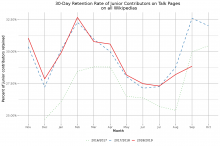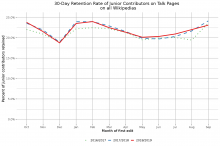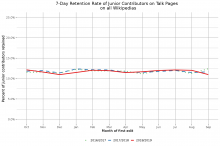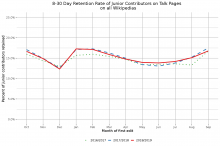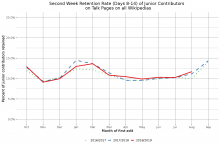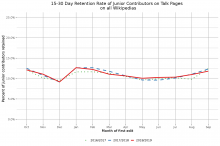We are curious to know what the 30-day retention rate of Junior Contributors using talk page features is. [1]
This information will be helpful for us in establishing a proper growth target for one of the key results for the project: Increase in the retention of junior contributors participating on talk pages by 5%. [2]
Done
- A single graph that shows the 30-day Junior Contributor talk page retention rate for multiple cohorts [3]
- A recommendation for % increase in the the 30-day Junior Contributor talk page retention rate we should target.
Notes
Precise definitions for terms like "Junior Contributors" and "retention" can be found here: https://www.mediawiki.org/wiki/Talk_pages_project/Glossary
- In T234046, we defined retention as, Contributors who come back to make an edit in any one of Wikipedia's 16 talk page namespaces within the 30 days that follow the "cool down" period. We have defined the "cool down" period as the 24 hours that follow a contributor's first edit during the study period as the starting point. //This metric definition, as well as others, now lives here: Talk pages project glossary
- Our current of a 5% increase over the lifespan of the project is a placeholder.
- "Multiple cohorts": to account for potential fluctuations in this metric, I thought it might be helpful to know the retention rate for multiple cohorts. There is likely a better approach to this, but I figured I'd enter it as a suggestion.
